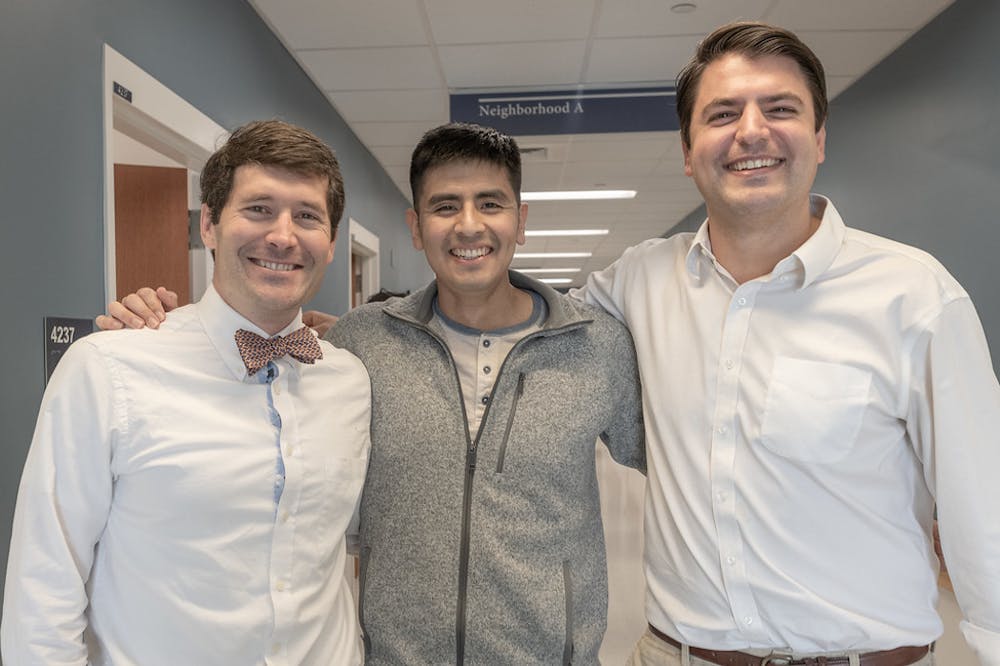Strokes are one of the leading causes of disabilities in the United States and cost an estimated $100 billion each year to prevent. That's why Mark McDonald, neuroimmunology fellow at the University’s School of Medicine, and Omar Uribe co-founded an early-stage digital health company — NeuroView — using artificial intelligence to identify early risk factors for strokes and provide a plan of action to each patient to alleviate these risks. Overall, this product works to reduce the number of strokes each year and help patients receive the best care in the shortest time possible.
Strokes can occur when the blood supply to the brain is cut short, meaning blood vessels that carry nutrients and oxygen to the brain are blocked by a clot or ruptured. As the supply of oxygen and nutrients gets cut off, brain cells die and cannot regenerate, preventing the proper function of other organs throughout the body. Annually, strokes kill 140,000 Americans, making it the fifth leading cause of death and disability in the U.S. Moreover, strokes can also result in lifelong disabilities including, but not limited to, paralysis or loss of motor control, chronic pain, aphasia and emotional disturbances.
In an attempt to address this issue, McDonald and Uribe developed NeuroView to focus on prevention and early stroke detection. Some early signs of a stroke include weakness, blurred speech, walking difficulty or drooping of the face.
“We are at an intersection in healthcare between a growing need for access to physicians and other limited resources and the opportunity to address access disparities through technology,” said Andrew Southerland, professor of neurology and public health sciences and a member of the scientific advisory board for NeuroView, in an email to The Cavalier Daily. “NeuroView seeks to build on this model by developing a virtual stroke clinic for patients and applying augmented intelligence to aid in neurologic diagnosis.”
NeuroView uses AI and telemedicine to protect at-risk patients through its virtual clinic, which provides a personal stroke neurologist to users.
“NeuroView’s platform or ‘virtual clinic,’ as we like to call it, addresses two key components of stroke care — 1. prevention 2. rapid diagnosis for early treatment,” McDonald said in an email to The Cavalier Daily. “The virtual clinic regularly checks on the health of patients using a multimodal approach of text-based questions, audio and video.”
The main goal behind this product is provide an action plan for the patient coming to the hospital with a thorough evaluation of risk-factors.
“Our goal is to intervene before the patient ever gets to the hospital,” Uribe said in an email to The Cavalier Daily. “We want to get that individual plugged [into] our system before they ever have a stroke.”
However, there are inevitable instances where a patient will have a stroke before NeuroView is able to detect one. For these cases, the best plan of action is to have Neuroview use its smart triage system to make critical transportation decisions and simultaneously talk to a neurologist who can evaluate the patient’s current situation.
“Going to the right hospital is critical because for every hour that clot-removal surgery is delayed, patients lose over seven months of disability-free life,” Uribe said. “Additionally, the patient’s information along with the tele-neurologist’s assessment will be relayed to first responders at the receiving hospital to further expedite treatment.”
One of the challenges the team faced was obtaining grant money for this project. Through a combination of public grants and private investment, they were able to overcome this obstacle. One source of support came from i.Lab, an organization that fosters startups, and its summer incubator program VentureLab.
According to David Touve, senior director of the Batten Institute for Entrepreneurship and Innovation at the Darden School of Business, the NeuroView team was connected with several Batten Institute initiatives, through which it received mentorship, workshop and grant support from VentureLab.
“NeuroView’s approach is one that points to a future for the medical industry in which machine intelligent augments, rather than wholly supplants, human intelligence and experience,” Touve said in an email to The Cavalier Daily.
The goals for the coming years are to work on expanding its team and building the company.
“We'll continue to scale our team … looking for [natural language processing] engineers and system architects to join the team … and we hope to create a minimally viable product or MVP within the year,” Uribe said. “Our goal is to start testing this MVP in a pilot program using our partnership with a large insurer.”







